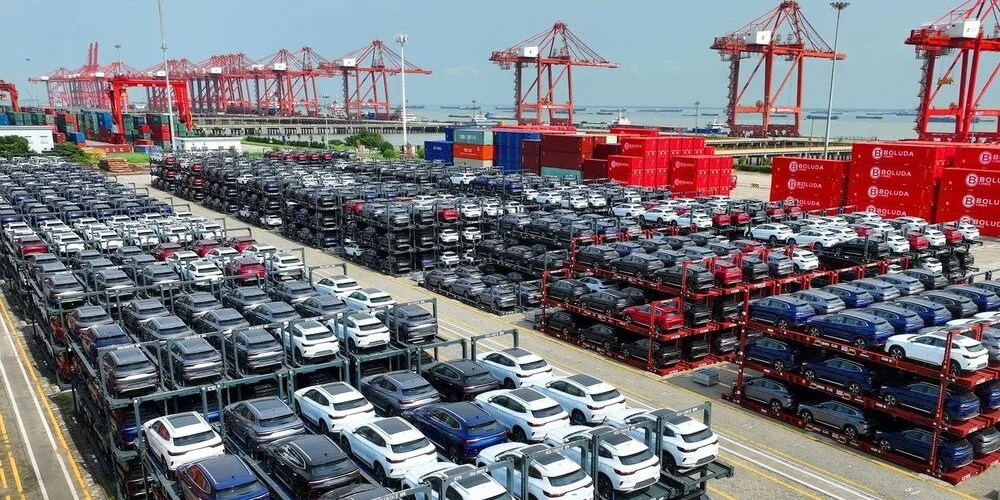The automotive sector stands as one of the cornerstones of the European industry, accountable for over seven per cent of the European Union’s (EU) GDP.
Within this sector, electric vehicles (EVs) are currently one of the most hotly contested technologies.
To gain competitive advantages and achieve the coveted leadership, the continent should promote not only the adoption of EVs, as it has done so far, but also their production, an area in which China excels.
According to a study conducted by the Real Instituto Elcano, in 2023 the Asiant giant accounted for 82 per cent of the total imports of batteries into the EU, while its share in zero-emission units reached 36 per cent.

“Put simply, we now have no option but to collaborate with China,” asserts Roger Atkins, Founder of Electric Vehicles Outlook, to Mobility Portal Europe.
Meanwhile, in the battery sector, in March 2023, the EU included in its Net Zero Act the objective that 90 per cent of the annual demand for this input on the continent should be met by local manufacturers, whose capacity should reach 550 GWh by 2030.
This component typically represents around 40 per cent of the manufacturing cost of an EV.
However, China leads the way with companies like CATL, the world’s largest manufacturer.
This is attributed not only to its technology but also to its preferential access to critical raw materials necessary for its production, such as lithium, cobalt, and nickel.
In this regard, the EU is seeking to position itself while also avoiding foreign dependencies.
Germany serves as a clear example with the inauguration of Vulcan’s first Lithium Extraction and Optimization Plant (LEOP) in Landau.

“It is a fact that in controlling the top part of the value chain, where access to materials, material refining, gigafactory capacity, etc., are located, I think we are a bit behind,” mentions Luca De Meo, CEO of Renault Group, during The Geneva International Motor Show.
However, this dependency is somewhat mutual.
According to the report published by the Real Instituto Elcano, China is relatively dependent on the European market, as around 40 per cent of its electric car exports are destined for the continent.
It’s worth noting that in 2023, China sold over eight million EVs, of which three million were BYD.
Of these, nearly one-fifth, 19.5 per cent, of electric vehicles sold in Europe last year were manufactured in the Asiant giant.
Furthermore, according to an analysis by Transport&Environment (T&E), one in every four EVs sold in Europe this year will be made in China.
Moreover, according to the study, it is already the world’s largest producer of zero-emission units, despite many of those it produces being foreign, accounting for 54 per cent of the global total.
In this regard, De Meo emphasizes: “You cannot create the power and scale that China has achieved in electric vehicles. We need to accelerate, which comes with cooperating.”
Recently, China has articulated policies supporting the eMobility sector.
The Asian country, lacking an automotive industry to protect as Europe does, directly embraced the 100 per cent electric car, both in terms of demand and production.
This also led to a surge in Chinese EV exports to the continent, prompting the European Commission to initiate an anti-subsidy investigation in October 2023 to determine if there is unfair competition.
The investigation covers all cars from the nation, including foreign brands manufactured there, such as Tesla, Renault, or BMW.
The European automotive sector has shown some concern about the protectionist race unfolding.
Last December, CEOs of the leading EU automakers demanded in a manifesto that fair conditions in global competition be ensured.
“Competition is very healthy. Real competition also means open global markets and fair and free trade rules,” De Meo emphasized.
China not only strongly leads the electric vehicle and battery market but also excels in the solar panel sector and fosters R&D in Europe.

In relation to this, Stefan Lundin, Head of Public Relations at Geely Holding in Sweden, commented on an article where Mobility Portal Europe tagged him regarding this topic and, upon request, expanded on his observations:
“In Sweden alone, where the magazine ‘Ny Teknik’ lists the country’s top R&D companies each year, Geely-invested companies and subsidiaries have occupied the top ten positions in terms of R&D personnel employed.”
And he details: “For example, CEVT was founded here in 2013 and with around 2000 employees in Gothenburg, developed the CMA architecture that has since been the basis for Volvo, Polestar, Lynk & Co, and Geely Auto cars.”
Given all this evidence, could Europe succeed in the electric mobility sector without China?
“It will be necessary to manage relations with China. Completely shutting them out would be the worst possible response,” Luca De Meo emphasizes in an open letter to the European Union.








